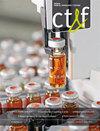Effect of the structural characteristics of naphthenic acids on the corrosion kinetics of an AISI SAE 1005
IF 0.5
4区 工程技术
Q4 ENERGY & FUELS
引用次数: 0
Abstract
Processing crudes with high naphthenic acid content causes corrosion problems on the crude oil distillation units. The total acid number (TAN) is commonly used to evaluate the corrosivity of crude oils; thus for decision-making related to corrosion mitigation and control in refineries. However, the TAN only represents the number of carboxylic groups present in the crude oil and does not consider the structural characteristics of the naphthenic acids, nor their reactivity, which are highly relevant to corrosion. On the other hand, the study of naphthenic acids as fractions with specific structural characteristics should enable the identification of differences in the corrosivity of crude oil with the same naphthenic acid concentration. In this research work, the fractioning of a commercial mixture of naphthenic acids was performed using the ionic strength of their respective salts. The structural characterization of the obtained fractions was conducted using Fourier-transform infrared and mass spectroscopy, gel permeation chromatography, and nuclear magnetic resonance. Furthermore, the corrosion rate of AISI SAE 1005 steel exposed to each fraction of naphthenic acids in the temperature range between 270 and 350 ºC was determined. Based on these results, a kinetic model of parallel reactions for predicting the concentration of dissolved iron in crude oil containing a mixture of naphthenic acids is proposed and validated.环烷酸结构特征对aisisae1005腐蚀动力学的影响
环烷酸含量高的原油在加工过程中会引起原油蒸馏装置的腐蚀问题。总酸值(TAN)是评价原油腐蚀性的常用方法;因此,对于与炼油厂的腐蚀缓解和控制有关的决策。然而,TAN仅代表原油中羧基的数量,而没有考虑环烷酸的结构特征,也没有考虑它们的反应性,这与腐蚀高度相关。另一方面,将环烷酸作为具有特定结构特征的馏分进行研究,应该能够识别相同环烷酸浓度下原油腐蚀性的差异。在这项研究工作中,利用环烷酸各自盐的离子强度进行了商业混合物的分馏。利用傅里叶变换红外、质谱、凝胶渗透色谱和核磁共振对所得组分进行了结构表征。在270 ~ 350℃的温度范围内,测定了AISI sae1005钢在各组分环烷酸下的腐蚀速率。在此基础上,提出了一种平行反应动力学模型,用于预测含环烷酸混合物原油中溶解铁的浓度,并进行了验证。
本文章由计算机程序翻译,如有差异,请以英文原文为准。
求助全文
约1分钟内获得全文
求助全文
来源期刊

Ct&f-Ciencia Tecnologia Y Futuro
Energy-General Energy
CiteScore
1.50
自引率
0.00%
发文量
7
审稿时长
>12 weeks
期刊介绍:
The objective of CT&F is to publish the achievements of scientific research and technological developments of Ecopetrol S.A. and the research of other institutions in the field of oil, gas and alternative energy sources.
CT&F welcomes original, novel and high-impact contributions from all the fields in the oil and gas industry like: Acquisition and Exploration technologies, Basins characterization and modeling, Petroleum geology, Reservoir modeling, Enhanced Oil Recovery Technologies, Unconventional resources, Petroleum refining, Petrochemistry, Upgrading technologies, Technologies for fuels quality, Process modeling, and optimization, Supply chain optimization, Biofuels, Renewable energies.
 求助内容:
求助内容: 应助结果提醒方式:
应助结果提醒方式:


